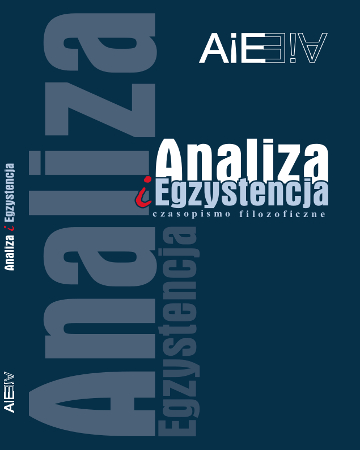
ISSN: 1734-9923
eISSN: 2300-7621
OAI
DOI: 10.18276/aie.2019.46-01





Issue archive /
46 (2019)
Problem interpretacji zasady Fiat iustitia, ruat coelum (The Problem of Interpretation of the Principle fiat iustitia, ruat coelum)
(The Problem of Interpretation of the Principle fiat iustitia, ruat coelum)
| Authors: |
Wojciech
Lewandowski

Katolicki Uniwersytet Lubelski Jana Pawła II |
| Keywords: | fiat iustitia ruat coelum absolutism justice catastrophe |
| Data publikacji całości: | 2019 |
| Page range: | 19 (5-23) |
Abstract
The Problem of Interpretation of the Principle fiat iustitia, ruat coelum
Most of the consequential and deontological interpretations of the fiat iustitia,
ruat coelum principle, do not allow treating it as a basis for resolving practical
problems. This article presents a proposal for an interpretation, under which this
principle can serve as a practical rule. This interpretation assumes that fiat iustitia,
ruat coelum applies to the final decision that affects the assessment of the entire
life of the agent or humanity. Success of this interpretation depends on whether the
lack of morally permissible possibilities to avoid individual or global catastrophe
may serve as a reason for accepting it.
Download file
Article file
Bibliography
| 1. | Bentham, J. (1789/2005). An Introduction to the Principles of Morals and Legislation. Red. J.H. Burns, H.L.A. Hart. Oxford: Clarendon Press. |
| 2. | Butcharov, P. (2006). Ethics dehumanized. W: T. Hogan, M. Timmons (red.), Metaethics after Moore (s. 367–390). Oxford: Clarendon Press. |
| 3. | Donagan, A. (2014). The Theory of Morality. Chicago: University of Chicago Press. |
| 4. | Dworkin, R. (1993). Life’s Dominion: An Argument about Abortion, Euthanasia and Individual Freedom. New York: Alfred A. Knoppf. |
| 5. | Fried, Ch. (1978). Right and Wrong. Cambridge, MA: Harvard University Press. |
| 6. | Glover, J., Scott-Taggart, M. (1975). It Makes No Difference Whether Or Not I Do It. Proceedings of the Aristotelian Society, Supplementary Volumes, 49, 171–209. |
| 7. | Hare, R. (1977a). Sprawiedliwość i równość. Etyka, 15, 143–144. |
| 8. | Hare, R. (1977b). Freedom and Reason. Oxford: Clarendon Press. |
| 9. | Jonas, H. (1996). Zasada odpowiedzialności. Tłum. M. Klimowicz. Kraków: Platan. |
| 10. | Kamm, F.M. (2006). Intricate Ethics. Rights, Responsibilities and Permissible Harm. Oxford: Oxford University Press. |
| 11. | Kamm, F.M. (2013). Bioethical Prescriptions. To Create, End, Choose and Improve Lives. Oxford: Oxford University Press. |
| 12. | Kant, I. (1979/2005). Metafizyka moralności. Tłum. E. Nowak. Warszawa: Wydawnictwo Naukowe PWN. |
| 13. | Kant, I. (1795/1995). O wiecznym pokoju. Tłum. F. Przybylak. Wrocław: Wydawnictwo Uniwersytetu Wrocławskiego. |
| 14. | Liebs, D. (2014). Das Rechtssprichwort Fiat iustitia et pereat mundus. Revue Internationale des Droits de l’Antiquité, 61, 83–95. |
| 15. | Mansfield, W.M. R. v. Wilkes 4 Burr 2527 [98 ER 327], 1770. |
| 16. | Moore, G.E. (1903/2003). Zasady etyki. Tłum. C. Znamierowski. Warszawa: Altaya DeAgostini. |
| 17. | Rashdall, H. (1907). The Theory of Good and Evil. Vol. 1. Oxford: Clarendon Press. |
| 18. | Radbruch, G. (1937). O celu prawa. Ruch Prawniczy, Ekonomiczny i Socjologiczny, 3, 325–336. |
| 19. | Saja, K. (2015). Etyka normatywna: między konsekwencjalizmem a deontologią. Kraków: Universitas. |
| 20. | Scheffler, S. (1982). The Rejection of Consequentialism. Philosophical Investigation of the Considerations Underlying Rival Moral Conceptions. New York: Oxford University Press. |
| 21. | Scheler, M. (1923/1976). O zjawisku tragiczności. W: Arystoteles, D. Hume, M. Scheler, O tragedii i tragiczności. Tłum. W. Tatarkiewicz, T. Tatarkiewiczowa, R. Ingarden (s. 49–95). Kraków: Wydawnictwo Literackie. |
| 22. | Shaw, W.H. (1995). Moore on Right and Wrong: the Normative Ethics of G.E. Moore. Dordrecht–Boston: Kluwer Academic Publishers. |
| 23. | Sidgwick, H. (1907). The Methods of Ethics. London: Macmillan and Company. |
| 24. | Watson, W. (1602/1974). A Decacordon of Ten Quodlibetical Questions concerning Religion and State. IIkley: Scolar Press. |
| 25. | Wheeler, A.M. (1986). Donagan on fiat iustitia, ruat caelum. Ethics, 4 (96), 873–875. |
| 26. | Williams, B. (1973). Against Utilitarianism. W: B. Williams, J.J.C. Smart, Utilitarianism For and Against (s. 75–150). Cambridge: Cambridge University Press. |
| 27. | Williams, B. (1995). Utilitarianism and Self-Indulgence. W: B. Williams, Moral Luck (s. 20–53). Cambridge: Cambridge University Press. |
| 28. | Woodard, Ch. (2008). Reasons, Patterns and Cooperation. London–New York: Routledge. |
| 29. | Zajadło, J. (2013). Łacińska terminologia prawnicza. Warszawa: Wolters Kluwer. |